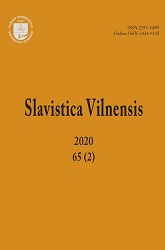Деньги в хозяйственной деятельности и языке старообрядцев Южной Америки
Money in Economic Activity and Language of the Old Believers of the South America
Author(s): Olga RovnovaSubject(s): Lexis, Semantics, Historical Linguistics, Sociolinguistics, Eastern Slavic Languages
Published by: Vilniaus Universiteto Leidykla
Keywords: Russian dialectology; Russian dialects used abroad; the Old Believers of the South America; dialect lexicology and lexicography; historic lexicology;
Summary/Abstract: The article investigates how lexemes within the lexical field “Money” are used in the Russian dialects of Old Believers spoken in Argentina, Bolivia, Brazil and Uruguay. The study addresses the use of recently borrowed names for monetary units as well as of the original Russian nouns. The dialectal material is compared with the data from the Dictionary of Contemporary Russian Colloquial Language and from a variety of dialectal dictionaries. Special attention is given to the names for Russian monetary units rublʹ and kopejka. The word kopejka has retained some of the original Russian figurative meanings and developed a new one. The fact that kopejka has not fallen into disuse in the figurative meaning is not surprising given that original Russian idioms are very well preserved in the dialects in question, including those with kopejka (the latter are analysed in the article). The study has demonstrated significant similarity between the Old Believers’ dialects in South America and Russian varieties spoken in Russia with respect to the semantic field “Money”. At the same time, the analysis has revealed several properties which are unique to the Old Believers’ dialects. These include deviations in lexical meaning, in collocational and stylistic properties, and in usage.
Journal: Slavistica Vilnensis
- Issue Year: 65/2020
- Issue No: 2
- Page Range: 65-82
- Page Count: 18
- Language: Russian

